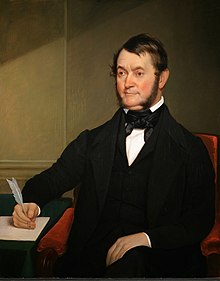Joseph Kinnicutt Angell
Joseph Kinnicutt Angell | |
|---|---|
 | |
| Born | April 30, 1794 Providence, Rhode Island, United States |
| Died | May 1, 1857 (aged 63) Boston, Massachusetts, United States |
| Occupation | Legal writer |
Joseph Kinnicutt Angell (April 30, 1794 – May 1, 1857) was an American legal writer born in
Early life and education
Joseph Kinnicutt Angell was born on April 30, 1794, in Providence, Rhode Island.[1][2] He was the only son of the shopkeeper Nathan Angell and his wife Amy (née Kinnicutt).[3][4] Thomas Angell, one of his ancestors, was a companion of Roger Williams, the founder of the state of Rhode Island.[4] In 1809, he entered Brown University and graduated in 1813 with a Bachelor of Arts.[1] There, he became a member of the Society of United Brothers,[5] an organization formed by the students who were not admitted to the Philermenian Society.[6] Among his classmates was the future Rhode Island Chief Justice Job Durfee.[4] In 1813, Angell joined Tapping Reeve and James Gould's Litchfield Law School in Connecticut.[1] There, he met the future Rhode Island Governor John Brown Francis.[7] Angell later joined the Providence office of Thomas Burgess. In 1816, he was admitted to the bar association of Rhode Island.[1][8]
Career
Early in his profession, Angell preferred to be a
Upon returning, Angell decided to pursue the profession of a legal writer.
In 1829, Angell started the publication of the United States Law Intelligencer and Review and served as its editor.[17] It was founded in Providence and soon was moved to Philadelphia.[18] During this time, he published A Treatise on the Limitations of Actions at Law and Suits in Equity.[17] Examining the legal consequences of "the infinite number of corporations" in the United States, he wrote Treatise on the Law of Private Corporations Aggregate (1832) and Essay on the Right of a State to Tax a Body Corporate (1837) with Samuel Ames.[1] In 1842, Angell signed the article titled "The Right of the People to Form a Constitution" (also known as "Nine Lawyers' Opinion") which asserted that "the legislature was the creature of the people, and was not superior to its creator".[1] After the adoption of the Constitution of Rhode Island in 1842, the position of reporter of the decisions of the Supreme Court of Rhode Island was created. Subsequent amendments directed the supreme court to appoint a reporter following the March 1845 elections. Angell was appointed as the reporter. He prepared two pamphlets about various cases of the supreme court before resigning in September 1849.[1][19]
Later life and death
After resigning, Angell wrote Law of Carriers of Goods and Passengers by Land and Water (1849) and Treatise on the Law of Highways (1857) on laws about transportation companies, and Treatise on the Law of Fire and Life Insurance (1854) about insurance companies in the United States.[1] He died on May 1, 1857, in Boston, Massachusetts. In 1999, the author Mark Warren Bailey wrote that Angell's writing met the "perceived need of a growing nation for a clear summary of current law as well as the necessity of selecting and featuring the most important cases from the rapidly growing number of adjudged cases and state reports."[1] His success is often attributed to his simple and direct writing style.[1][20]
See also
References
- ^ a b c d e f g h i j k l m n o Bailey 2000.
- ^ Arnold 1883, p. 303.
- ^ Austin 1891, p. 1.
- ^ a b c Hopkins 1880, p. 3.
- ^ Brown University 1848, p. 6.
- ^ Mitchell 1993.
- ^ Hopkins 1880, p. 4.
- ^ Hopkins 1880, p. 5.
- ^ Hopkins 1880, p. 8.
- ^ Hopkins 1880, p. 13.
- ^ Hopkins 1880, p. 14.
- ^ RIHS 1872, pp. 86–87.
- ^ Hopkins 1880, p. 15.
- ^ Hopkins 1880, pp. 15–16.
- ^ Dorn 2021.
- ^ Carroll 1932, p. 1062.
- ^ a b Hopkins 1880, pp. 17–18.
- ^ Mott 1957, p. 451.
- ^ Hopkins 1880, pp. 20–21.
- ^ Hopkins 1880, pp. 24–25.
Works cited
- Arnold, James N., ed. (1883). The Narragansett Historical Register. Narragansett Historical Publishing Company. Retrieved May 21, 2022 – via Internet Archive.
- Austin, John Osborne, ed. (1891). The Ancestral Dictionary. E. L. Freeman & Sons. Retrieved May 21, 2022 – via Internet Archive.
- Bailey, Mark Warren (2000) [1999]. "Angell, Joseph Kinnicutt". ISBN 978-0-19-860669-7. Retrieved May 21, 2022.
- Triennial Catalogue of the United Brothers' Society of Brown University. Brown University. 1848. Retrieved May 21, 2022 – via Google Books.
- Carroll, Charles (1932). Rhode Island: Three Centuries of Democracy. Vol. 2. Lewis Historical Publishing Company. Retrieved May 21, 2022 – via Internet Archive.
- Dorn, Nathan (September 24, 2021). "Collection Highlights: Chancellor James Kent". Library of Congress. Retrieved May 22, 2022.
- Hopkins, Stephen (1880). Rhode Island Historical Tracts No. 11. S. S. Rider. Retrieved May 21, 2022 – via Google Books.
- Mitchell, Martha (1993). "United Brothers". Encyclopedia Brunoniana. Retrieved May 21, 2022 – via Brown University.
- Mott, Frank Luther (1957). A History of American Magazines: 1741–1850. Harvard University Press.
- Proceedings of the Rhode Island Historical Society. Rhode Island Historical Society. 1872. Retrieved May 21, 2022 – via Internet Archive.
